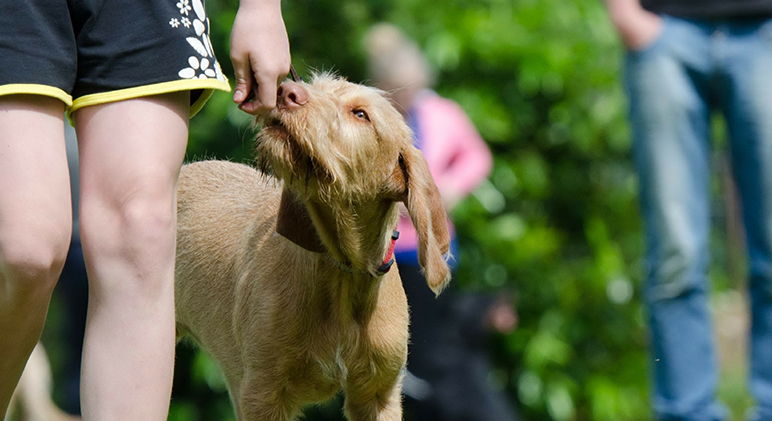Gone are the days when Fido was just the family pet. Today, little Fido is a bonafide family member and, at times, can be a handful. Whether you have a pooch who is chewing everything in sight, barking up a storm, causing chaos in your home, or suffering from separation anxiety – many of us find ourselves in need of some help. Sometimes finding the right professional to provide that help can be a challenge, though. So the question is … do you need a dog trainer or dog behaviorist?
Dog Behaviorist vs Dog Trainer
Dog Trainer: When you’re thinking about a “dog trainer,” think of a teacher or coach. A dog trainer will help teach your dog new skills, such as sit, stay, come, or how to walk on a leash without dragging you down the street.
Dog Behaviorist: When you think about a “dog behaviorist,” think about a therapist. The behaviorist will help you solve behavioral issues like fear, aggression, out-of-control barking, destructive chewing, biting, and separation anxiety. The behaviorist will help you modify or totally change behaviors. After conducting a thorough interview and analyzing your pooch, the behaviorist will design a plan based on that analysis.
How To Find The Right Trainer Or Behaviorist:
When searching for a dog trainer or behaviorist you may want to look for someone who is certified. Certification shows you that your professional has educational training, experience in the field, and has passed a comprehensive competency exam. Looking for a trainer or behaviorist is like trying to find a good tutor for your human kids. Although I do recommend starting your search for a certified professional, if you find a trainer or behaviorist who came highly recommended and isn’t certified, that shouldn’t stop you from trying him/her. There are no legal regulations for trainers and behaviorists, so in your search, you are very likely to meet many self-taught candidates. It’s not uncommon to have a trainer or behaviorist who is self-taught (the perfect example of this is the famous Dog Behaviorist Cesar Millan).
Other Tips:
- Ask for referrals from your veterinarian, groomer, local pet store, family, or friends OR go through a Certifying Agency. An agency will often have a directory of professionals you can search through (I have included two links below).
- Ask your potential trainer/behaviorist for references.
- Ask your potential trainer/ behaviorist how long they’ve been training dogs and if they have any formal education/certifications (if yes, by what organizations).
- See if they are a member of any professional trainer or behaviorist associations.
- Find out what type of services the person offers.
- Ask what type of equipment they use during training.
- Make sure they use positive and humane methods that you are comfortable with.
- Make sure you can be present during training sessions.
- Do they offer any guarantees? The answer to this one will probably be no. After all, you are your canine kid’s caretaker and will be the one who must practice any methods that you’ve been taught. Your professional is limited to the time he/she spends with you and your pooch. So, in the end, it will be your follow-through that will reap the total success.
More About Certification
I’ve included a couple of links that may help in your search of finding a certified trainer or behaviorist. Just fill in your zip code and you can search for a local trainer who has been certified by The Association Of Professional Dog Trainers (APDT). Or you can go through the Certification Council For Professional Dog Trainers (CCPDT).
What does the certification designation mean as defined by the CCPDT?
CPDT-KA indicates that a dog trainer has passed a comprehensive exam and has at least 300 hours of dog training experience.
CPDT-KSA indicates that a dog trainer has passed a comprehensive exam and an objective skills-based assessment along with at least 300 hours of dog training experience.
CBCC-KA indicates that a dog behavior consultant has passed a comprehensive exam on behavior modification and has at least 300 hours of dog behavior consulting experience.
If you are having any issues with your fur kids that you aren’t able to resolve on your own, don’t get frustrated. Help is out there. Good luck in your search for the right trainer or behaviorist.
Before You Start With a Behaviorist or Trainer …
It’s always a good idea to get your pooch checked out by your vet to make sure there are no underlying medical issues sparking the behavioral problem!








